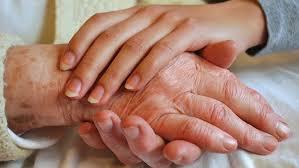
I'm not afraid of being dead. I'm just afraid of what you might have to go through to get there.”
My youngest uncle who is 46 yrs old would be undergoing a surgery for mouth cancer that was detected two months back. The surgery is estimated to last for five- six hours. Every time I hear about a loved one undergoing a complex and critical surgery it brings back the memories of my own surgeries . As for my parents, they are reminded of the time when their happy go lucky and full of life daughter wanted to end her “cabbage existence”
I firmly believed in the phrase “ life is a gift” till at the age of 19 when my routine surgery went horribly wrong and I was bedridden for a month. A month where the doctors did not know if I would survive the ordeal that my body had undergone ; a month which witnessed my weight go down from 50 kgs to 35 kgs and when the IV bottle and stand became my constant companions. After the first layer of my skin being corroded, even the lightest of touch sent shock waves in my body. I lost count of the times I was wheeled in the operation theatre for getting the mainline inserted in my neck. Five neat cuts and then the sewing up; All without any local anaesthesia.
Why am I talking about things that happened almost two decades back you may wonder. What is the point of re-visiting the pain and the suffering when I am clearly past it. The entire incident not only changed my outlook towards life but also redefined my thought process towards valuing life.
From someone who was a staunch believer in life being the best gift that anyone can have, I was converted to someone who believes that your moments, days, weeks and years have meaning only when you can “live” them not merely “exist”. With this belief comes my belief in euthanasia or mercy killing,
Euthanasia has been a hotly debated topic with if you are not with us you are against us line of thinking. The word “euthanasia” comes from combining two Greek words: “Eu” meaning “good”, and “thanatos” meaning “death”. In short “ Good Death”. Can death ever be good? Can something that signifies the end of the gift of God be endowed with any goodness? My month long brush with a phase where I wanted death as passionately as a dying person may want life has led me to conclude that precious as it may be, living life sometimes becomes so excruciatingly painful because of your physical ( and mental) illness that death seems a far better alternative.
It is only paradoxical in my view that in a society where the right of self determination is the premise of any right based approach, the right to decide where life is worth living at all is regarded as a gross volition of valuing life. One of the arguments that is put forth by the anti- euthanasia campaigns is that if suicide is not advocated for under any circumstance why should euthanasia be allowed. To compare suicide with mercy killing would be severely twisting logic. Suicide is intentional killing of self arising out of lack of motivation to live. Euthanasia on the other hand is assisted killing of a sick person purely due to medical reasons. People may point to that “ lack of motivation” as a commonality between the two. It may however be noted that in cases of suicide the person finds him/herself surrounded by circumstance which he/ she finds totally incapable of dealing with. It could range from extreme poverty to failure in an exam ; from a death of a family member to inability to pay debt. Very rarely it is about the severity of the medical condition of the person himself.
A life stripped of even the minutest shred of dignity is a life where it’s worth is compromised. The right of a competent, terminally ill person to avoid excruciating pain and embrace a timely and dignified death is what euthanasia is all about. A patient is permitted the right to determine whether he/ she would want to want to discontinue a certain kind of treatment because it is too painful to endure and would only ensure prolonging of life . By that logic choosing to end life for the same reasons should not lead to a debate. Euthanasia should be a natural extension of patient's rights allowing him to decide the value of life and death for himself. Unfortunately, the supports of those who are pro-life base their argument on the fallacy that euthanasia is an “easy way out” vis a vis providing palliative care. It needs to be mentioned that euthanasia is not a hasty decision based on the emotional appeal of the patient or his family but strictly on medical grounds and availability of medical treatment that would ensure quality of life to the patient. All possible options regarding palliative care are deliberated and only when they are exhausted , is the decision taken to terminate the life to keep the remaining dignity of the patient intact and to relieve him of the un-ending endless pain that has made his life a mere existence.
Physical and mental well being of a person is of paramount importance and a crucial indicators of quality of life. A person should be allowed to have control over his body and personhood. He should be allowed the right to make decisions that impact him. Euthanasia is an attempt to provide the option of exercising that right. The exercise of this right is as central to personal autonomy and bodily integrity. If taking the life of a person without his consent is considered a crime then it is as much a crime to make someone live who with justification does not wish to continue prolonging his life.
Most protesters of euthanasia take refuge of region and morals while defending their stand. In their zeal and enthusiasm they forget that even their respective religions advocate for a life that is free of pain of any kind; a life which allows a person to contribute towards society in a meaningful manner with his full potential. Then why are we averse to the mere thought of a terminally ill patient wishing to end his life with medical justification rather than languishing in the prison of false hope.
I have often come across the logic “ Who decides if a life is worth living”. Added to this is another line “ Certainly not the state”. No definitely not the state. It is here that the right of self determination comes in. Again this right of self determination is not absolute. Life is precious and a citizen of a nation needs to be provided all means to secure it. Only when these means are not available is the right of self determination sanctioned by the state with supporting medical evidence. The evidence that proves beyond doubt that an extension of such a life would only be for the namesake and would have no bearing whatsoever on the quality of life.
“What is important is how well you have lived your life, not how long:” , goes a saying in Hindi. People who believe in the absolute sanctity of life also believe that permitting euthanasia is “shortening” life. What if the treatment was around the corner when the decision was taken? Advocates however behave in a manner which can be termed nothing but myopic. The hard data is totally ignored. The data that states that there is no hope and terminal illness is the last and very painful stop before death.
One of the biggest myths about euthanasia is that it will target the most vulnerable and marginalized. Especially in the Indian sub- continent where even today the deaths occur because of avoidable and preventable disease or simply due to lack of access to affordable treatment. Not invalidating the fear, I would like to submit that the process of legalization of any issue is a long process. Months of parliamentary debates and deliberations take place, experts from various walks of life are consulted, similar laws from other countries are laboriously studied by jurisprudence experts before it is even tabled in the form of a bill. No nation is foolish enough to pass a law based on its whims and fancies alone without taking the sentiments and the changing times into account.
No price tag can be attached to a life, it is invaluable. Euthanasia seeks to “cheapen” life by making death an easy option. Flood gates would be opened to a murder- happy world. So say the anti- euthanasia supporters. Let’s talk about the Netherlands for a moment: Every year, roughly 3,000 Dutch people seek to be euthanized. That sounds like a lot, until you realize it accounts for only 1.7 percent of all deaths. Also how many laws that are legislated guarantee application. Despite the Special Marriage Act in India, inter- caste and inter- religious marriages are still looked down upon. Even though the Supreme Court has legalized “live- in “ relationships in India and accorded female partners the same rights as a wife, it hasn’t actually resulted in rushing to co-habit with each other outside of marriage. Passing of an optional legislation should not be equated with its application.
The life we actually live is a minuscule part of our existence, the rest is just time we count. Why should a person be forced to “merely count time” in the name of preserving life? What life would it amount to if the quality is severely compromised, the right of self determination taken away and the person is deprived of the control of his own consciousness.
If we stop viewing euthanasia as a battle between the preservation of life versus giving a licence to “easy” death and view it preserving the last shreds of dignity and allowing a person to take away the anguish that has become a part of his being, maybe we can be more open to “mercy killing”.










Add new comment